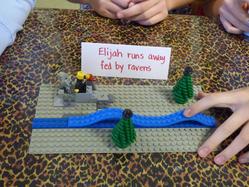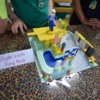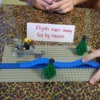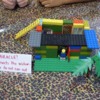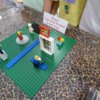Elijah and The Widow of Zarephath
Creative Writing Workshop
Summary
Explore the feelings of Elijah, as well as the widow, through a variety of creative writing activities.
Passage
Bible Story: 1 Kings 17
Key/Memory Verse: 1 Kings 17:24 (NLT)
Objectives for Workshop
Children will:
- Find the story of Elijah in the Old Testament of the Bible;
- Know that Elijah was a prophet of God: that prophets were God’s chosen messengers;
- Learn that when we are obedient, God provides;
- Understand that Elijah’s time away hiding was a time to strengthen his trust in God; bigger challenges were coming in Elijah’s life;
- Explore the feelings of Elijah and the widow.
PREPARATION
Read Bible Background.
Materials List
- Calligraphy pens, markers, and permanent markers
- Chalk
- Chalkboard, newsprint pad, or white board
- Handout of Poetry Patterns
- Index cards, 3” x 5” – 28 cards
- Paper, 8 ½” x 11” white
- Optional
- Water color paints or water color pencils
- Colored cardstock
Advance Preparation
- Duplicate a copy the Poetry Pattern Handout for each child.
- Set out markers and paper for each child.
- Prepare the Name Cards by writing the words Elijah, Widow, King, Ahab, and Zarephath on the index cards, one letter per card. If the class is large, prepare several sets of cards.
- Scramble each set of name cards -- Elijah cards in one set, Widow cards in one set, and so forth -- and set them out on the table.
PRESENTATION
Welcome and introduction
As children arrive, greet them and direct them to the scrambled name cards on the table. Have the children unscramble the cards so they spell the name of a character from the Bible story.
Say: Were you able to unscramble the name cards? What were the names you discovered?
Today’s Bible story is about these people. Elijah was a great Old Testament prophet. What is a prophet? [A person who brings God’s message to others.]
Now in order to understand today’s story, we need to go back a little in history. Elijah lived during the time in history when the kingdom of Israel had been divided into two kingdoms – a northern kingdom called Israel and a southern kingdom called Judah. Elijah lived in the northern kingdom. Most of the kings who ruled during this time had turned away from God. They were worshiping false idols. And so, God sent prophets to bring a message to the kings, telling them to repent, and to worship the one, true God again. Elijah was one of these prophets.
Now the King of the northern kingdom at that time was King Ahab, one of the most evil of all the kings! Elijah tried very hard to convince King Ahab to change his ways but King Ahab wouldn’t listen. God even stopped the rains from coming and there was a terrible drought in the land. But still King Ahab didn’t listen. Instead he tried to kill Elijah. Elijah was forced to run for his life!
But God took care of Elijah. God sent Elijah to live by a brook where there was water and God sent ravens to feed Elijah bread and meat.
But remember there was no rain, and so after some time, the brook dried up. Now there was no water for Elijah. What will he do? Let’s see what happens to the prophet Elijah.
Bible story
Help the children locate 1 Kings 17 in their Bibles. Read, or paraphrase, 1 Kings 17:7-24 as the children follow along.
Ask:
What was Elijah’s job? [To be a prophet]
Why did Elijah go to Zarephath? [Brook had dried up, God told him to]
What did Elijah ask of the Widow? [Some water and bread]
How do you think the widow felt as she shared her last bit of flour and oil with a stranger?
What happened when the widow shared her flour and oil with Elijah? [Her oil and flour did not run out]
Have you ever been asked to give up something very important to you and give it to someone else? Describe what happened and how you felt.
What other amazing miracle happened while Elijah stayed with the widow? [Her little boy died and Elijah raised him from the dead.]
How do you think Elijah felt when the boy died? What about the widow?
What happened when Elijah cried out to the Lord? [The Lord heard his cry and brought the boy back to life.]
What did the widow say about Elijah when her boy was returned to her? [Now I know that you are a man of God and that the word of the Lord from your mouth is true!]
ELIJAH POEMS
Tell the class that they are going to create poems about Elijah and the widow of Zarephath. Poetry is a type of writing that helps us understand our feelings and the feelings of others. Let’s think about some of the feelings of the characters in today’s lesson.
Using the board or newsprint, make a category for Elijah and one for the widow. Brainstorm information about the two characters to write in each category. Encourage the children to include descriptive words about the characters – how they looked, how they felt, and what they did.
Say: Let’s create a poem about Elijah using some of these words. Poetry does not have to rhyme. In fact, the poetry in the Bible doesn’t rhyme at all! In Hebrew poetry, ideas are repeated, instead of sounds! We are going to create a special type of poem called a Cinquain poem. Cinquain is a French word. Cinq means five in French. Cinquain poems have five lines and follow the pattern below:
Line 1: 1 word noun used as title
Line 2: 2 adjectives that describe the title
Line 3: 3 action words
Line 4: 4 feeling words in a phrase
Line 5: 1 word synonym for the title
Brainstorm together a Cinquain poem about Elijah. Write the poem on the board or paper.
Pass out the Poetry Handouts, paper, and markers.
Explain that there are many types of poetry. Have the children choose one type from the Poetry Handout and create their own poem about Elijah or the Widow of Zarephath.
If time allows, the children may wish to illustrate their poem using watercolor paints or watercolor pencils.
Reflect
Ask for volunteers to read one or more of the poems.
Close in prayer, “Thank you God for the amazing story of Elijah and the Widow. Thank you for providing for Elijah and providing for us, too. Amen.”
ADDITIONAL SUGGESTIONS
Make copies of the children’s poems and compile them into a booklet.
Have the children read some of their poetry during worship.
Use one of the poems and illustrations as a worship bulletin cover.
Adaptation – Younger Children
Use the “Shape Poems,” “God’s Eyes Poems” or “Sensory Poems” for the youngest children.
Adaptations – Older Children
Have the children write poems for more than one character.
Have the participants use several different types of poetry to create more than one poem.
RESOURCE
Poetry for Kids: http://www.kathimitchell.com/poemtypes.html
HANDOUT – POETRY PATTERNS and TYPES
Cinquain
Cinquains have five lines
Line 1: Title (noun) - 1 word
Line 2: Description (adjectives) - 2 words
Line 3: Action - 3 words
Line 4: Feeling (phrase) - 4 words
Line 5: Title (synonym for the title) - 1 word
Write a Cinquain poem about one of the characters from the story such as Elijah, the widow, God, or King Ahab.
Diamonte
The Diamonte is a form similar to the Cinquain. The text forms the shape of a diamond.
Line 1: Noun or subject - 1 word
Line 2: Two adjectives that describe line 1
Line 3: Three 'ing words that describe line 1
Line 4: Four nouns - the first two are connected with line 1; the last two are connected with line 7
Line 5: Three 'ing words that describe line 7
Line 6: Two adjectives that describe line 7
Line 7: Noun Synonym for the subject
Write a Diamonte poem about one of the characters from the story such as Elijah, the widow, God, or King Ahab.
Acrostic
The first letters of lines in acrostic poems form a word vertically.
Example:
Daring
Obedient
Good friend
Write an Acrostic poem about one of the characters or objects from the story such as Elijah, the widow, God, King Ahab, oil, or flour.
Biographical
Write a poem about a character.
Line 1: Character’s Name
Line 2: 3 descriptions of person ______ _______ ______
Line 3: Related to _________
Line 4: Who lives _______
Line 5: Who loves _______ ______ and ________(3 people, things or ideas)
Line 6: Who feels _______ about _______ (1 emotion about 1 thing)
Line 7: Who needs ______ ________ and _______ (3 things needed)
Line 8: Who gives ______ _______ and ________ (3 things given or shared)
Line 9: Who dreams _____ ______ and ______ (3 dreams or wishes)
Line 10: Name or Nickname
Write a Biographical poem about one of the characters from the story such as Elijah, the widow, God, or King Ahab.
Shape Poem
Shape poems are made up of words that have been placed in such a way that they make the shape of an object and also use words to describe the object.
Draw a simple outline of the shape or object. Make the drawing large enough to fill the paper. Go over the drawing with a dark marker. Write a sentence that tells about the shape. Include feeling and action words. Next, place a piece of paper over the shape. Write the sentence over and over again so that they outline the shape and fit well together.
Choose a shape from the story like a jar of oil, a raven, a face, or a simple paper doll style or human body shape, and create a shape poem about Elijah or the widow.
Sensory Poem
Sensory poems use the five senses to describe a subject, person or feeling.
Line 1: Describe what the subject looks like.
Line 2: Describe what the subject sounds like.
Line 3: Describe what the subject tastes like.
Line 4: Describe what the subject smells like.
Line 5: Describe what the subject feels like or how it makes you feel.
Write a Sensory Poem about one of the characters or events in the story such as Elijah, the Widow, the little boy, God, King Ahab, Elijah running away, Elijah by the brook, Elijah at the Widow’s house, the little boy dying, and so forth.
Example:
Elijah Runs
Running away looks fast, like everything is a blur.
Running away sounds loud, like your heart pounding in your chest and rushing in your ears.
Running away tastes salty, and wet, as your sweat drips into your mouth.
Running away smells like fear.
Running away feels lonely and empty and so tired you just want to stop running…
God’s Eye
God’s Eye poems tell about things that God is able to see and understand and that might be hard for us to see. God’s Eye poems tell what is really happening because God knows what is really happening even when we might not.
(Based on Third Eye Poetry – Poetry for Kids, by Kathi Mitchell
http://www.kathimitchell.com/poemtypes.html)
Example:
God’s eyes see when others are mean to you and you feel all alone.
God’s eyes see when you are tired and lonely and need a friend.
God’s eyes saw Elijah when he was hungry and thirsty.
Write a God’s Eye poem about what God might be seeing in the story of Elijah and the Widow of Zarephath.
Written by Jaymie Derden for Rotation.org
Copyright 2006 Rotation.org
A representative of Rotation.org reformatted this post to improve readability.

